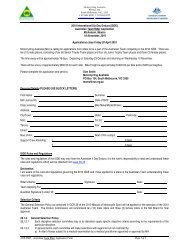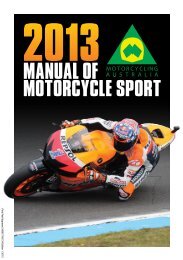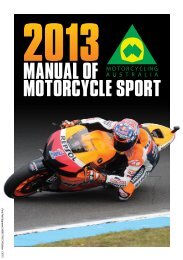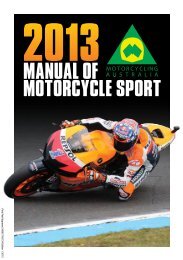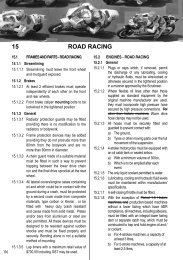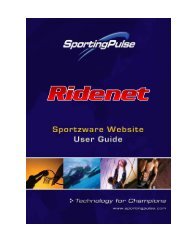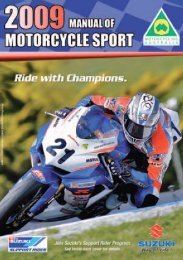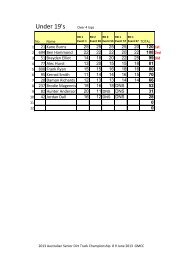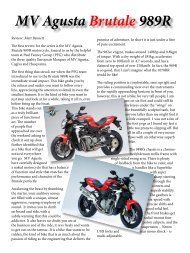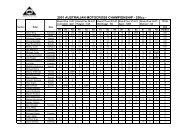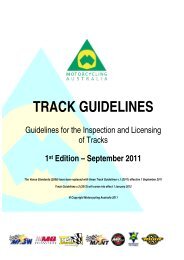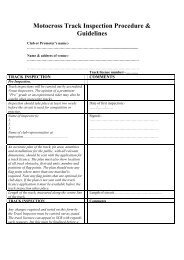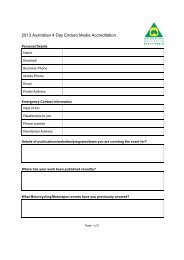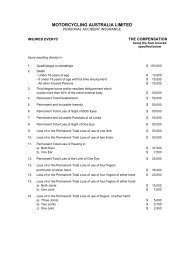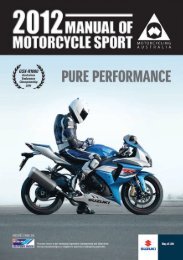2008 Manual of Motorcycle Sport - Motorcycling Australia
2008 Manual of Motorcycle Sport - Motorcycling Australia
2008 Manual of Motorcycle Sport - Motorcycling Australia
Create successful ePaper yourself
Turn your PDF publications into a flip-book with our unique Google optimized e-Paper software.
their licence.<br />
The chapter also sets out the processes by which<br />
competitors can obtain a licence, and the means by<br />
which applicants can appeal against the refusal <strong>of</strong> a<br />
licence or the imposition <strong>of</strong> a condition on their licence.<br />
Chapter 4 - Competitions<br />
The intent <strong>of</strong> this long chapter is to codify present<br />
practices throughout the sport.<br />
Much <strong>of</strong> the chapter is taken up with establishing the<br />
mechanisms for running competitions, and imposing<br />
the conditions under which those competions can take<br />
place.<br />
The chapter also deals with breaches <strong>of</strong> these Rules,<br />
and the processes to take place in the event that the<br />
Rules are breached.<br />
Chapter 5 - Protests and Appeals<br />
The application <strong>of</strong> fair and natural justice is an inherent<br />
condition <strong>of</strong> these rules.<br />
Where participants wish to protest against the actions <strong>of</strong><br />
an <strong>of</strong>ficial or another participant, these rules <strong>of</strong> natural<br />
justice require a mechanism for the fair hearing <strong>of</strong> their<br />
protests, which is established in this chapter.<br />
The chapter also sets out the jurisdiction and limits <strong>of</strong><br />
power <strong>of</strong> the appelate bodies.<br />
Chapter 6 - Judicial Committee Guidelines<br />
This chapter sets out the composition <strong>of</strong> Judicial<br />
Committees and also provides a commentary on the<br />
process that the Committee undertakes to adjudicate<br />
on the matters brought before them.<br />
Chapter 7 - <strong>Sport</strong>ing Commissions<br />
One <strong>of</strong> the functions <strong>of</strong> the <strong>Sport</strong>ing Commissions is to<br />
reconcile the competing interests in any discipline.<br />
Technology and other changes mean that Commissions<br />
need to find a balance between ensuring that motorcycle<br />
sport is affordable to as many participants as possible<br />
while not setting up a rule book circumscribed by<br />
anachronisms.<br />
Chapters 8 & 9- Accreditation Schemes<br />
All sporting bodies need to ensure that those involved<br />
in the development and control <strong>of</strong> the sport have the<br />
tools they need to do their jobs.<br />
The National Accreditation schemes established by<br />
these chapters are an effort to ensure the future <strong>of</strong><br />
the sport through the development and training <strong>of</strong> its<br />
<strong>of</strong>ficials and coaches.<br />
Chapter 10 - Personal Accident Insurance<br />
The chapter on insurance is a simple summary <strong>of</strong> the<br />
coverage <strong>of</strong> MA’s insurance scheme, setting out the<br />
36 enjoy the ride<br />
benefits available to participants in the sport.<br />
The full details <strong>of</strong> the Personal Accident Insurance<br />
Scheme are available in the insurance policy<br />
documents.<br />
Chapter 11 - MA Anti-Doping Policy<br />
While the use <strong>of</strong> performance enhancing drugs is not<br />
as big an issue in motorcycle sport as in some other<br />
fields, MA recognises the need for a comprehensive<br />
and prescriptive program to ensure that our sport is<br />
free from the use <strong>of</strong> illicit drugs.<br />
Guided by the principals <strong>of</strong> fair and natural justice and<br />
ensuring that our sport is safe and fair, this chapter<br />
sets out the mechanisms for screening participants,<br />
the testing <strong>of</strong> samples and the consequences <strong>of</strong> being<br />
outside <strong>of</strong> the internationally recognised WADA code.<br />
Chapter 12 - All Disciplines<br />
One <strong>of</strong> the most important aspects <strong>of</strong> interpretation<br />
<strong>of</strong> these Rules is that they are permissive rather than<br />
prohibitive. In other words, in almost all cases, the<br />
Rules describe the things that may be done rather than<br />
the things that may not.<br />
This chapter contains the Rules which apply to all<br />
disciplines. Any rule in one <strong>of</strong> the discipline specific<br />
chapters will, unless otherwise stated, be in addition to<br />
the provisions <strong>of</strong> Chapter 12. So Chapter 12 and the<br />
relevant discipline chapters operate side by side.<br />
For the purposes <strong>of</strong> these Rules, the age <strong>of</strong> Junior<br />
competitors is now taken as on January 1 each year.<br />
Full details are found at GCR 12.15.01<br />
Competitors over the age <strong>of</strong> 16 years may not compete<br />
in a junior competition, subject to GCR 12.15.0.1, and<br />
a person who is under 16 may not compete in a senior<br />
competition.<br />
Chapter 13 - <strong>Australia</strong>n Championships<br />
These Rules prescribe the allocation, categories and<br />
listing <strong>of</strong> <strong>Australia</strong>n Championships.<br />
Chapters 14 to 28 - Discipline Specific Chapters<br />
As far as possible, the discipline specific chapters<br />
follow a common format as follows:<br />
• Protective clothing,<br />
• Frames and parts,<br />
• Engines,<br />
• Fuel,<br />
• Classes, and<br />
• Competition Rules.<br />
<strong>2008</strong> MANUAL OF MOTORCYCLE SPORT



